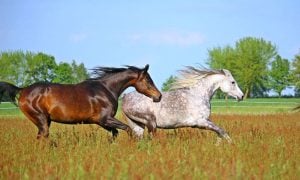
by Norman Berdichevsky (March 2022)
The common American idiom “I’m so hungry, I could eat a horse” is not meant to be literal. Few Americans or Brits would seriously consider eating horse meat, which actually is illegal in the United States today, but surprisingly, not in Great Britain. The actual practice of eating horse flesh was termed was termed Hippophagy (in Greek) to make it sound more acceptable. It has been an important part of the diet in many “non-Western” countries such as Japan, China and Indonesia for many generations.
In those nations where a Judeo-Christian cultural background s prevails as a result of the common practice of keeping domestic animals, notably dogs, cats and horses, it has been outlawed and is generally regarded as a “primitive custom”, resorted to only in times of crisis to avoid famine. Although horse meat has been an important ingredient in dog food, many Americans and Brits considered its use for human consumption as taboo, verging on cannibalism.
A month ago when I passed by a local pub, “The Hart”, in Eastbourne England where I have been living now for the last five months, I had to do a double-take when I saw the ad in the picture below …
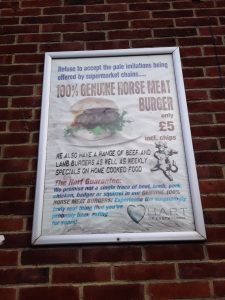
Could this be the same Britain long made famous internationally by the high regard its people have cultivated for pets and the protection of animals bordering on the eccentric and sometimes involving fortunes left to animal charities and cemeteries?
The basis for the this is the Old Testament injunctions in Leviticus 11 against the consumption of horses, which, like pigs, have cloven hooves that make them forbidden for Jews (non-kosher). In Mexico, France, Germany, Poland, Belgium, and Switzerland, it is nevertheless still popular but not a staple of the diet as in China and Japan. The demand at Italian and French butcher shops has not damaged the image of these two nations for being the home of culinary excellence, refined dining and gourmet foods, although often shocking American tourists who discover these meats on the menu.
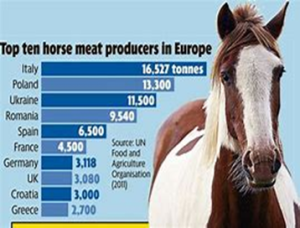
Curiously, Islamic law did not follow Judaism with regard to horses or camels but accepted the Old Testament prohibition on eating pork. According to Muslim scholars eating horses is not forbidden (haram) but is better avoided (makrooh).

Image above French butcher shop
As early as 721, Pope Gregory III instructed his subjects to stop eating horse because it was an “impure and detestable” pagan practice. Butchers who were organized in guilds increased the distinction between their work and that of those called knackers, who were regarded as the lowest order in the profession. The took apart the carcasses of dead animals, especially old horses into edible meat and other parts.
By the 16th century, the practice of eating horse meat—had become a capital offense in France, later reversed in spite of the long standing taboo of the Catholic Church of more than a thousand years. In chaotic times of war, revolution and famine, as a result of …
1.Napoleon’s 1815 retreat from Moscow in winter, his soldiers were forced to kill their horses and eat the meat or starve.
2.During the disaster of defeat in the Franco-Prussian War and the ensuing chaos and siege of the Paris Commune in 1870-71, the French civilian population were again on the verge of starvation unless they resorted to killing their horses and eating them.
The time was thus ripe to socially engineer a reversal so that good French Catholics need not fear their disobedience to the Papal edict and the reverence many felt for the age-old association of horses with companionship, royalty, the love of children, and the prestige of the cavalry in military traditions. They were helped by the efforts of Etienne Geoffroy Saint-Hillaire, a zoologist and military veterinarian determined to prove that horse meat was healthy and nutritious. He managed to stage highly publicized public banquets featuring horse meat that proved successful and also demonstrated the beneficial effect in leading to a reduction in the prices paid by the wealthier section of the population (who still shunned horse meat) for the more traditional meats. His success was further confirmed by the huge increase of almost 80% of horse meat consumed in France by the working class from 1895 to 1905.
The American Story
In the U.S., when beef prices rose, canners shipped it abroad during World War I. By 1919, Congress was persuaded to authorize the Department of Agriculture to provide official inspections and approval stamps for American horse meat. Nevertheless, as soon as beef returned after the war, most working-class consumers abandoned horse meat. During World War II food shortages, horse meat was again substituted for beef on a large-scale but the post-war backlash was rapid.
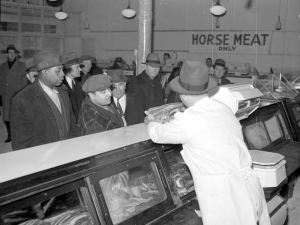
The photo above shows Detroit butcher shop selling horse meat during the war years 1942-45 (not affected by rationing as were other more traditional meats such as chicken, beef, lamb, turkey, and duck).
At the end of the war Keeping “Horse meat” legal was a major American political issue. A common political insult to condemn and label the incumbent administration in the U.S. was …. “You don’t want your administration to be known as a horse meat administration, do you?” This was the advice of New York’s charismatic popular mayor and “Fusion-Republican candidate” Fiorello La Guardia to warn his Democrat successor William O’Dwyer. President Truman was nicknamed “Horse meat Harry” by Republicans during food shortages in the run up to the 1948 election.
Repeated Scandals Involving Horse Meat in Europe
Scandals in Europe involving horse meat erupted in December 2012, when the Food Standards Agency Ireland (FSAI) tested a range of frozen foods that uncovered DNA evidence of horse and pig meat in products labeled beef. The FSAI released their findings in January 2013, and scandal erupted in the following weeks throughout the industry involving other European countries and their supply chains of imported “beef products.”
They created headline news and incited the passions of both the European and American pet-loving public. For those who have never tasted it or even seen it, horse meat is darker, with a coarser grain and its yellow fat provides almost as much omega-3 fatty acids as farmed salmon. Its proponents claim it contains twice as much iron as steak.
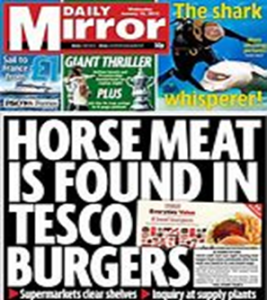
The 2013 a horse meat scandal in European Union counties resulted to accusations against many well- known chains of fast-food outlets such as Burger King and McDonalds and several major supermarket chains. Horse meat’s low price and resemblance to beef however made it easy to sneak into ground meat and sausages.
In ancient times and in other cultures it made no sense killing animals or slaves that did useful work and created wealth for their masters. In other cultures, animals had little or no value as pets, or playthings. They had to do useful work or be raised for slaughter and prepared as food. This traditional utility would have been squandered if they were slaughtered in order to eat before their “prime” nutritional value was reached and they were still being used for work or leisure purposes.
With the advent of farm machinery and motorized vehicles to carry heavy and cumbersome loads, the value of beasts of burden declined precipitously. Britain more than other European nations strongly rejected hippophagy at an early stage, perhaps because it could adequately source adequate red meat from its empire and the strong sentimental cavalry associations of the British military.
In America, the Pilgrims had brought with them the European religious prohibition on eating horse flesh, inherited from the Bible and Christian tradition. Beef prices continuously fell even during the Civil War, thanks to a beef surplus derived from the abundant western cattle ranges, with faster transportation and refrigeration providing new and efficient access to urban markets.
New, more stringent regulations put in place in the 1906 Pure Food Act could not reverse this overnight and wipe out the suspicions due to unconfirmed rumors that many American soldiers in the Spanish-American War had died from eating horse meat. The 1973 oil crisis pushed up the price of beef leading to a temporary rise in cheap domestic horse meat sales. But encountered strong resistance. Horse loving protestors picketed stores on horseback, and some American firms were forced to discontinue horse meat sales to Europe and Asia.
In 1997, an Oregon horse slaughterhouse called Cavel West was burnt down in an attack claimed by the “Animal Liberation Front” and never rebuilt. Nonviolent activists also applied pressure to the horse meat business, with California banning the transport and sale of horses for meat. Horse-loving activists and politicians worked to shut the industry down. In early September 2006, the House of Representative Slaughter Prevention Act passed into law. Republican John Sweeney called the horse meat business “one of the most inhumane, brutal and shady practices going on in the United States today.”
President Donald Trump wanted to cut a useless budget item that the Bureau of Land Management used to care for wild horses (mustangs) so that instead of paying to feed them, he suggested lifting restrictions preventing the sale of American horses to foreign horse meat dealers supplying Canadian and Mexican slaughterhouses but it simply became another charge to hang round his neck by the Democrats.
After my first visit to The Hart, I returned to the pub after making a decision that if the ad was still current, I would order a horseburger. I would make thereby make my own decision but would not go searching further afield. In a chat with the pub-owner I learned that orders were stopped “at least ten years ago” (BUT no one had bothered to remove the sign) due to difficulties of adequate supply and cold storage.
Just prior to submitting the article I went shopping and passed by the HART pub again and LO AND BEHOLD, the horseburger and Chips Poster was gone, replaced by a quite standard one for an entirely run of the mill pub with everyday mundane fare thus solving my ethical dilemma. A bit of Eastbourne’s historic character and cultural geography had disappeared! Had my query just a week earlier embarrassed the owner?
______________________
Norman Berdichevsky is a Contributing Editor to New English Review and is the author of The Left is Seldom Right and Modern Hebrew: The Past and Future of a Revitalized Language.
Follow NER on Twitter @NERIconoclast
- Like
- Digg
- Del
- Tumblr
- VKontakte
- Buffer
- Love This
- Odnoklassniki
- Meneame
- Blogger
- Amazon
- Yahoo Mail
- Gmail
- AOL
- Newsvine
- HackerNews
- Evernote
- MySpace
- Mail.ru
- Viadeo
- Line
- Comments
- Yummly
- SMS
- Viber
- Telegram
- Subscribe
- Skype
- Facebook Messenger
- Kakao
- LiveJournal
- Yammer
- Edgar
- Fintel
- Mix
- Instapaper
- Copy Link










7 Responses
Good article.
Horsemeat is very nutritious and it helped me recover from severe anaemia. I had surgery 25 years ago, when I lost a lot of blood. I was in Italy at the time and my then mother-in-law went to a special butcher’s shop where she bought horse steaks and served them – raw of course – in olive oil and chopped garlic. I had seven of them, one every evening for a week and it cured my anaemia without a doubt. I have as many qualms about eating horse as I have about any other meat. Whenever I’m in Norway, for example, I have a whale of a time…
“Horse Meat Harry” and omega 3. Two of the most interesting items concerning hippophagy that you will not want to miss from this well-researched article by Norman Berdichevsky written after he spotted a poster advertising a horse burger in Eastbourne, England recently. A great romp through history with the dos and don’ts of eating horsemeat, from biblical times through the current.
Fascinating historical survey over an expression I to which I previously never gave a second thought. I’m truly enlightened over this aspect of trefe consumption. Bravo!
As a child growing up in my native Brazil, I never ran across horse meat for human consumption. This is not to say that it isn’t available there. I view the horse as a partner of men, and perhaps for that reason, I would not seek an opportunity to eat horse meat. I am sure I would reconsider my position in case of starvation. Norman Berdichevsky’s essay on horse meat is interesting and illuminating. Well done!
Jo Pires-O’Brien’s astute and preceptive remarks fully duplicated the response I got from my wife’s nephew in Argentina expressing revulsion at the very idea of eating the most faithful ally of the vaqueiro and gaucho as with the American cowboy whose cultural traditions, and economic mainstay of their herding and ranching economy were founded on a deep emotional attachment with their horses. The legend and lore of the three countries elevated the horse to a prime position that remained embedded in folklore event when the majority of the population became overwhelmingly urban oriented.
Among the personal communications I received from a friend who is a German doctor there was no hint of any emotional attachment. He and his wife had once tried a meal with horse meat. They admitted the nutritional value it provided but gave their honest evaluation that it tasted tasted “too sweet” and were “put off” by the taste and the knowledge that it was quite unlikely to appeal to any of their close friends.
I will admit that ten years residence in Florida was not sufficient for me to sample an alligator sandwich or stew on many menus and the same may be said on travels abroad where frogs’ legs, snails (two French delicacies”) or various insect based dishes were offered on Asian market stalls.
On a boys’ skiing holiday to Swizerland many years ago there was so little snow on the Swiss side that we skied the Italian side where we found a great restaurant serving what we called Dobbin steaks. Very nice they were too. It was noted that those of the party whose wives/girl friends had horses seemed to relish them the most.